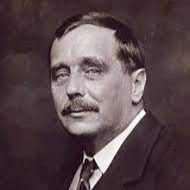A COMMENT
Jan 27, 2023

English novelist, journalist, sociologist, and historian best known for such science fiction novels as The Time Machine.
English novelist, journalist, sociologist, and historian best known for such science fiction novels as The Time Machine.
Jan 27, 2023
Jan 24, 2023
Jan 20, 2023
Jan 08, 2023
Jan 27, 2023
Jan 24, 2023
Jan 20, 2023
Jan 08, 2023